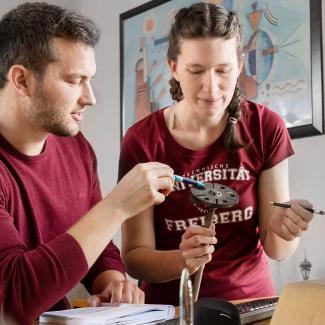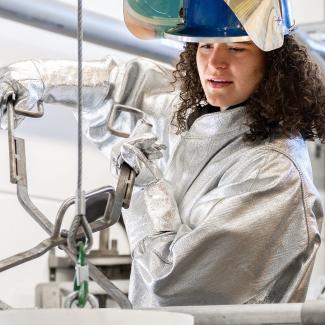Wirtschaftsingenieurwesen
"All-rounder" is an apt description of an industrial engineer. The Industrial Engineering and Management programme offers a broad education in mathematics, natural sciences, engineering and business and economics, so that graduates can be employed in almost any field. They are expected to work at interfaces, understand specialists from different fields and build bridges between departments. This requires not only engineering expertise but also business know-how and the ability to familiarise oneself with complex tasks.
The interdisciplinary Bachelor's programme teaches the fundamentals of business and economics and engineering disciplines, while also providing the opportunity to specialise. Students can choose from a number of technical specialisations that focus on different areas such as raw materials extraction, mechanical engineering or materials technology. The course lasts seven semesters and is divided into on-campus study, an internship and the Bachelor's thesis. Upon completion of the bachelor's degree, students have the opportunity to continue with a master's degree in industrial engineering.
Freiberg for five reasons
Innovative teaching methods: Our programmes not only teach the necessary skills to meet current and future job market needs, but also use innovative teaching methods – from simulation games over flipped classroom concepts to gaming apps.
Interdisciplinary approach: Our programmes recognise that many real-world problems are multifaceted. The programmes take this into account by combining courses from different disciplines within the faculty and beyond.
Excellent learning environment: Studying in Freiberg takes place under the best conditions. Many, excellently equipped lecture theatres, a modern university library and innovative teaching and research facilities, including mixed reality facilities and a behavioural research lab, provide an excellent starting point for studying in Freiberg.
Cutting-edge topics: Our courses are research-based and address topical issues such as digital transformation and the circular economy. This enables students to broaden and strengthen their skills and enhance their employability.
Students take centre stage: Small groups, close contact with professors and their teams, and individual support are the hallmarks of the study programmes at the Faculty of Business Administration. Through direct exchange and dialogue, we help to develop forward-looking and creative personalities.
- Faculty
-
Faculty of Business Administration (Faculty 6)
- Degree
-
Bachelor of Science (B. Sc.)
- Standard period of study
-
7 Semester
- Part-time possible
-
No
- Start of studies
-
Winter semesterSummer semester
- Admission requirement
-
Abitur or subject-specific higher education entrance qualification or an entrance qualification recognized as equivalent
Language requirement
- Application: with at least B1 level German
- Admission to the degree program: with C1 level German (e.g. DSH-2)
- language courses and DSH exam at TUBAF
- Prep Courses (Studienkolleg)
- Course language
-
German
Graduates in Industrial Engineering and Management have the opportunity to work in many different roles and areas. These include production planning and control, marketing and sales, transport and logistics, project management and consultancy, and finance and controlling.
In addition, the skills and expertise of industrial engineers are valued in a wide range of sectors, including the automotive industry and its suppliers, consultancy, the chemical industry, energy supply, mechanical and plant engineering and many more.



